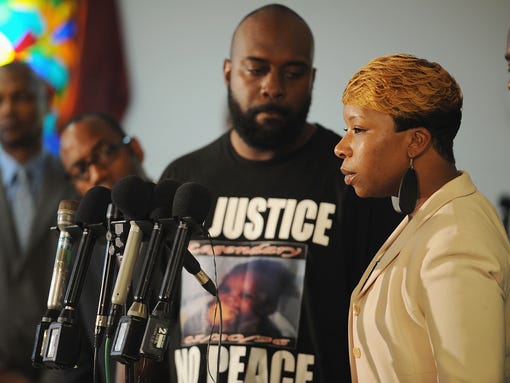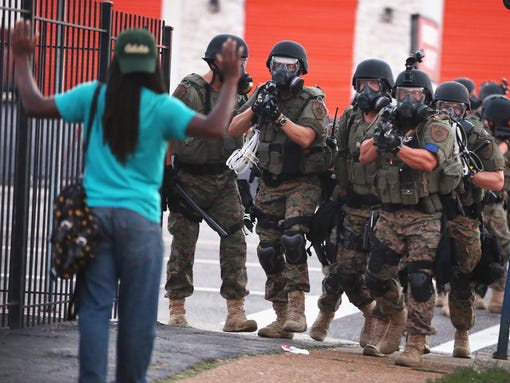Racism or Militarized Police?
These are the two main issues at stake in the protests and riots currently occurring in Ferguson, MO. I am no policy expert, and I am not a reporter on the scene, but I do feel like this news story may prove interesting as far as what it reveals about the American public. In particular, how will Americans (namely white Americans) respond to these two issues.
 |
| Lesley McSpadden, Michael Brown's mother |
First, there is the complaint that racism is still at work. As the argument goes, Michael Brown was unfairly targeted and shot to death more or less because he was black, not because he deserved it. Had Michael been a white teen, he would have escaped with his life--if he had been troubled by police at all. This side of the story is very similar to the case of Trayvon Martin a couple of years back.
When the Trayvon Martin case was in the news, we basically saw white Americans take two different sides. There were those who sided with the black community and demanded justice because they felt Trayvon had been killed simply for the color of his skin. Then, there were others who more or less defended George Zimmerman. They questioned whether Trayvon was truly innocent and they attacked the idea that his character that night was spotless. They defended the law that allowed Zimmerman to use his gun. They denied that race had anything to do with the murder and claimed it was just certain black activists "playing the race card."
However, the problem in Ferguson is a little different. The accusation of racism does not center on a black individual and a white individual. Rather, this case centers on a black teen and an entire system. In particular, it is a system almost everyone, conservative or liberal, recognizes is probably in the wrong. While the shooting itself will likely be disputed in much the same way Trayvon's death was, the reaction of the police that followed has startled Americans. The brutal crackdown of police on protestors has left many Americans in shock.
This sets up two powerful issues that people are seeking to correct--racism and the militarization of the police. What I find interesting about this story is that those white Americans who would normally lament the overreaction of big government/police state are also the same ones who would often ignore or minimize the existence of racism in shootings like this. However, with the problems in Ferguson, we have both of these issues closely linked. It becomes much harder to condemn the use of military/police force without also simultaneously condemning the police for racism. If the police are treating ordinary citizens this harshly, is it really that hard to believe that an officer shot an unarmed teen because he was black? In both narratives the police of the city are out of line.
And so, I wonder how white Americans will react to this story. In my mind I see 3 basic reactions that will (and have begun to) occur.
First, a few white Americans will condemn both wrongs. They will admit that racism played a part in this murder and will also condemn the extreme force that was used against protestors.
Second, others will minimize the problems that exist in Ferguson. They will point out that the media has made the police reaction sound worse than it actually is (for instance). The police have not overreacted, instead the media has overreacted. Of course, this also has the effect of suggesting that the media (and blacks) have overreacted on the race issue as well.
Finally, and I suspect this will be the most popular option among whites, we will focus mostly on the militarization of the police and on big government while practically ignoring the accusations of racism that began it all. Instead, we will debate the rightness or wrongness of the police handling of the protests. Even worse, many whites will minimize or dismiss charges of racism. I have already read of few stories and comments attacking Jesse Jackson and Al Sharpton for simply going to St. Louis because they want to be on camera. Yet, these same stories and comments will also ignore countless other black leaders who are calling out the racism implicit in this situation.
In my eyes, the situation in Ferguson is an excellent opportunity for white America to wake up to the reality of racism in America today. In particular, it provides a chance to examine implicit racism that may exist in law enforcement and in criminal justice systems. But most importantly, it should give us a chance to look at the racism inside each of us as well.
For instance, I am appalled by the fact that just about any adult, black male you ask can tell you stories about when they have been pulled over or stopped by police for seemingly no reason apart from the fact they are black. In fact, many of my black friends can even joke about these occurrences because they are such a common experience. But for me--the white male--I have no such experiences. I can honestly say I have never been pulled over because of the color of my skin. Not so for many of my friends and colleagues.
Racism is alive. I have seen it at work too much in central Texas. However, I guarantee it exists all over the country. Whenever we as whites assume that "white" is the default color for humanity (as most of us unconsciously do) we are giving into racism. We notice that this person is "black" or that person is "Hispanic/Asian/etc.," but we don't really notice that those like us are "white."
When the color of our skin allows us to drive around without fear of being stopped by police or being harassed about where we are going, we benefit from racism.
Whenever I wear a hoodie and don't have my character or honesty judged, I benefit from racism.
And so, I will be watching carefully as the story in Fergusson unfolds. Where will the emphasis be? What will my white friends focus on? Will they find a way to think about the police actions along with the issue of racism? Or, like usual, will we fumble through the question of race and continue ignoring ways we allow racism to live on in our country contrary to the Kingdom of God?




No comments:
Post a Comment